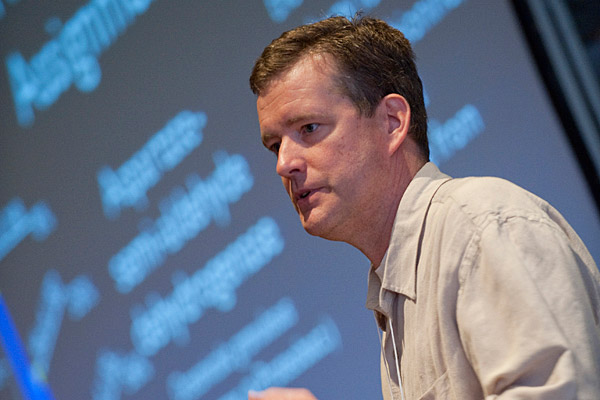
E. coli research
UD's Wommack part of $25 million USDA food supply safety study
12:51 p.m., Feb. 21, 2012--K. Eric Wommack, professor of environmental microbiology in the Department of Plant and Soil Sciences at the University of Delaware, is part of a five-year, $25 million U.S. Department of Agriculture (USDA) study aimed at preventing potentially fatal illnesses linked to Shiga toxin-producing E. coli bacteria (STEC) in the nation’s food supply.
STEC poses a serious threat to the food supply, resulting in more than 265,000 infections in the United States each year.
Research Stories
Chronic wounds
Prof. Heck's legacy
The coast-to-coast study includes a team of 48 investigators from multiple universities and government agencies, with the University of Nebraska and Kansas State University as the lead institutions.
Wommack became involved with the project after serving on a USDA grant review panel with Jim Keen, the lead project director from the University of Nebraska, who had been studying STEC for a number of years and was putting together the project proposal. “It was really just good fortune on my part to be lucky enough to be involved with the group,” said Wommack, adding that he has not previously worked with STEC but can potentially bring a new angle to the research through his experience in microbial ecology.
As a microbial ecologist, Wommack said he is “interested in all the microbes that make up communities of microbes.” He equated this to an environmental ecologist, only instead of looking at “all the plant species within the make-up of the forest or the grassland, I look at all the microbes that comprise a microbial community.”
For this study, Wommack will examine the microbial communities that form around STEC to see if there is a pattern that scientists can pinpoint. This would allow the researchers to trace non-toxic levels of STEC by determining the kinds of microbial communities where it is most likely to occur.
“It is difficult to detect STEC when it is at the non-poisonous levels, but it is still there and so my work may show that there are other microbes that just happen to occur alongside STEC but are a whole lot easier to find. It is not like (STEC) is the only bacteria in a cow, so we are interested in looking at the larger communities that surround the pathogenic organisms.”
Wommack also will try to understand the ecology of STEC on a fundamental level. “Although it is an organism that is an awful pathogen and kills people,” Wommack explained, “it is also a microbe that is out there and it has to live in whatever environment it is found in, and so most everything we know about STEC is when it is making people sick. We don’t really know much about it other than that -- meaning its place in the ecology of microbial communities.”
Wommack said he is excited to get started on this research project, anticipating that he may begin work as soon as March. “It is hard to argue against knowing more,” he said. “Knowing and understanding more about the biology and the ecology of the organism will ultimately help us to control its incidence in the food supply.”
About Prof. Wommack
K. Eric Wommack is a professor in UD's Department of Plant and Soil Sciences in the College of Agriculture and Natural Resources.
He also has appointments in the Department of Biological Sciences in the College of Arts and Sciences and in the marine biology and biochemistry program in the College of Earth, Ocean, and Environment. His laboratory is based in the Delaware Biotechnology Institute.
Wommack received a doctorate in marine estuarine environmental sciences from the University of Maryland, a master's degree in physiology from the University of St. Andrews in Scotland and a bachelor's degree in economics from Emory University in Atlanta.
He is a member of the American Society for Microbiology, the American Society of Limnology and Oceanography and the International Society for Microbial Ecology.
Article by Adam Thomas
Photo by Evan Krape








